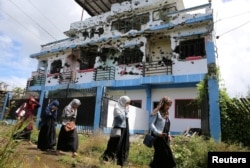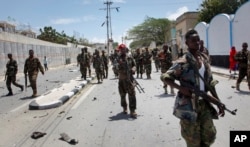The United States is ramping up pressure on regional and local Islamic State operatives and facilitators, part of an effort to shut down the terror group’s global financial lifeline.
The U.S. Treasury Department Friday announced sanctions against a series of individuals and companies from Somalia, Turkey and the Philippines, describing the moves as part of a larger campaign targeting networks that helped give the terror group access to money, weapons and even drones.
“Each individual and entity targeted has contributed to the spread of ISIS’s terror reach in their respective corner of the world,” Under Secretary for Terrorism and Financial Intelligence Sigal Mandelker said in a statement, using an acronym for the terror group.
At least one of the individuals is in custody.
Abdulpatta Escalon Abubakar was detained in September by Philippine authorities at the airport in Manila, after flying in from Saudi Arabia.
Working with IS
U.S. officials said Abubakar had been working with IS since at least the start of 2016 and had helped transfer tens of thousands of dollars to the IS affiliate in the Philippines. It is thought he also worked with the affiliate’s now deceased leader, Isnilon Hapilon, to acquire weapons and explosives.
Treasury officials also sanctioned two businessmen, one from Turkey and one from Somalia.
Officials said Yunus Emre Sakarya set up his company, Profesyoneller Elektronik, in Turkey in 2015 and used it as a front for IS, helping the terror group acquire more than $500,000 in components for unmanned aerial vehicles, or drones.
In Somalia, where IS has been struggling for years to establish a presence to compete with the al-Qaida-affiliated terror group al-Shabab, U.S. officials targeted Mohamed Mire Ali Yusuf, a well-known smuggler.
U.S. officials said Yusuf used his livestock trading company to help funnel money to Abdulkadir Mumin, the leader of IS in Somalia.
But Yusuf’s activities on behalf of IS may have been even more extensive. In 2016, a United Nations task force tied him to a larger network of smugglers who have supplied multiple groups. And two Somali government sources told VOA’s Somali service that Yusuf maintains several boats and has run weapons and other contraband between Yemen, Dubai and Somalia.
The Somali officials also said Yusuf arranged for weapons shipments to IS in Somalia on multiple occasions.
‘Isolating nodes’ in IS network
Some analysts see the targeting of operators like Yusuf as a positive sign.
“Treasury is doing its part to isolate nodes in the global Islamic State logistics network that provides support for the militants’ transnational operations and on-the-ground activities,” said Jade Parker, a senior research associate at the Terror Asymmetrics Project.
For months, U.S. and Western intelligence officials have warned that despite the collapse of its self-declared caliphate in Iraq and Syria, IS had managed to preserve its lines of communication as well as some of its logistical capabilities.
A key part of that success, they said, was the result of the close relationship IS had forged with smugglers and other global criminal organizations.
Analysts like Parker hope the latest round of sanctions is an indication the U.S. and its partner may be starting to make a dent in that loose but beneficial alliance.
“By designating, and ultimately removing, these actors from their financial and material support roles, it provides international entities and local authorities leverage to further degrade the capabilities of Islamic State affiliates,” she said. “I anticipate we’ll see many more of these kinds of designations going forward.”
Harun Maruf with VOA’s Somali service contributed to this report.






